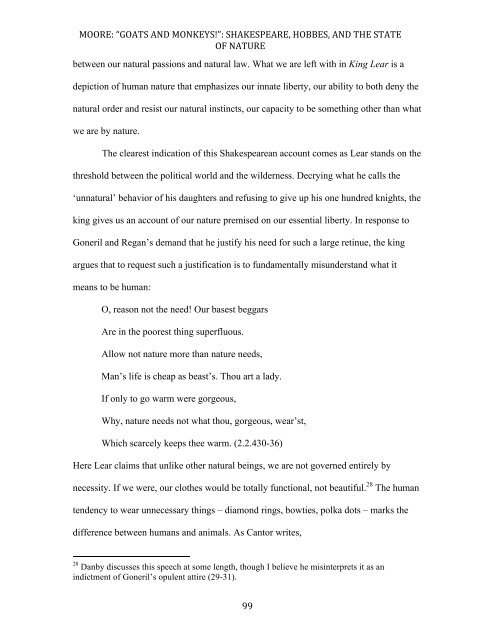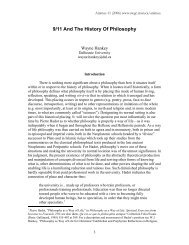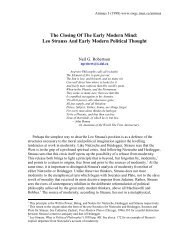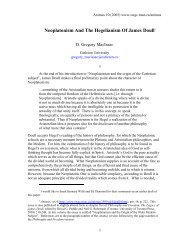âgoats and monkeys!â: shakespeare, hobbes, and the state of nature
âgoats and monkeys!â: shakespeare, hobbes, and the state of nature
âgoats and monkeys!â: shakespeare, hobbes, and the state of nature
You also want an ePaper? Increase the reach of your titles
YUMPU automatically turns print PDFs into web optimized ePapers that Google loves.
MOORE: “GOATS AND MONKEYS!”: SHAKESPEARE, HOBBES, AND THE STATE <br />
OF NATURE <br />
between our natural passions <strong>and</strong> natural law. What we are left with in King Lear is a<br />
depiction <strong>of</strong> human <strong>nature</strong> that emphasizes our innate liberty, our ability to both deny <strong>the</strong><br />
natural order <strong>and</strong> resist our natural instincts, our capacity to be something o<strong>the</strong>r than what<br />
we are by <strong>nature</strong>.<br />
The clearest indication <strong>of</strong> this Shakespearean account comes as Lear st<strong>and</strong>s on <strong>the</strong><br />
threshold between <strong>the</strong> political world <strong>and</strong> <strong>the</strong> wilderness. Decrying what he calls <strong>the</strong><br />
‘unnatural’ behavior <strong>of</strong> his daughters <strong>and</strong> refusing to give up his one hundred knights, <strong>the</strong><br />
king gives us an account <strong>of</strong> our <strong>nature</strong> premised on our essential liberty. In response to<br />
Goneril <strong>and</strong> Regan’s dem<strong>and</strong> that he justify his need for such a large retinue, <strong>the</strong> king<br />
argues that to request such a justification is to fundamentally misunderst<strong>and</strong> what it<br />
means to be human:<br />
O, reason not <strong>the</strong> need! Our basest beggars<br />
Are in <strong>the</strong> poorest thing superfluous.<br />
Allow not <strong>nature</strong> more than <strong>nature</strong> needs,<br />
Man’s life is cheap as beast’s. Thou art a lady.<br />
If only to go warm were gorgeous,<br />
Why, <strong>nature</strong> needs not what thou, gorgeous, wear’st,<br />
Which scarcely keeps <strong>the</strong>e warm. (2.2.430-36)<br />
Here Lear claims that unlike o<strong>the</strong>r natural beings, we are not governed entirely by<br />
necessity. If we were, our clo<strong>the</strong>s would be totally functional, not beautiful. 28 The human<br />
tendency to wear unnecessary things – diamond rings, bowties, polka dots – marks <strong>the</strong><br />
difference between humans <strong>and</strong> animals. As Cantor writes,<br />
28 Danby discusses this speech at some length, though I believe he misinterprets it as an<br />
indictment <strong>of</strong> Goneril’s opulent attire (29-31).<br />
99
















